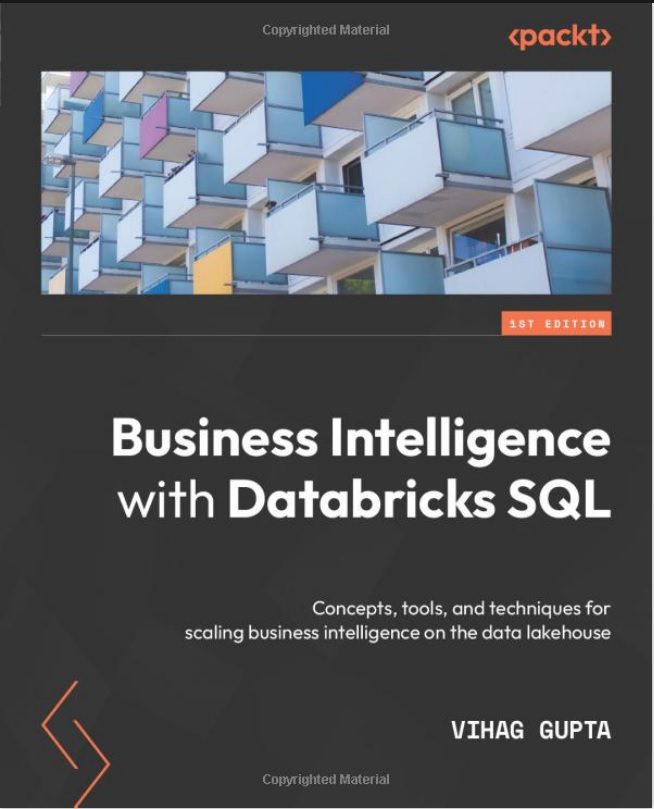Vihag Gupta is the author of Business Intelligence with Databricks SQL, we got the chance to sit down with him and find out more about his experience of writing with Packt.
Q: What is/are your specialist tech area(s)?
Vihag: I specialize in Solutions Architecture in Data & AI. This includes Data Engineering, Data Warehousing a,nd Machine Learning Operations.
Q: How did you become an author for Packt? Tell us about your journey. What was your motivation for writing this book?
Vihag: Packt reached out to me to author a book on Databricks SQL when it(Databricks SQL) was making a lot of headlines in the data warehousing world. Databricks SQL is a challenger to the status quo of the data warehousing. It uses a radically different approach and design philosophy. This is what made me write the book. Customers of Databricks have access to technical enablement resources and can easily absorb new tools like Databricks SQL. However, there are a lot of technology practitioners who want to learn about Databricks SQL. My aim with the book is to reach them and teach the about Databricks SQL – what it is, what it does and what makes it so good.
The journey has been quite a positive experience. I had a lot initial hesitation on committing my time to such a long endeavour. Also, considering that Databricks SQL is evolving rapidly, there was also the fear of constantly changing content. However, the Packt team was very accommodating and gave me the freedom to keep updating the content as much as humanly possible. They were also very accommodative of my learning curve as an author as well. I could see my writing evolve from the clunky first drafts to the very polished final drafts.
All in all, it was an enriching experience.
Q: What kind of research did you do, and how long did you spend researching before beginning the book?
Vihag: Business Intelligence and Data Warehousing is not my primary area of strength. This actually proved to be a blessing for the text. I had the vantage point of approaching the book from the lens of the user who does not know much about Databricks SQL or data warehousing on the data lakehouse.
I took a fair amount of time to research the hardware, software, people and process components of BI and DW before penning down the chapters. The research was ongoing to be honest – because as I was penning down chapters, new questions arose in me and by association, I figured out that those questions will be asked by the reader as well. So every topic was well researched – some on the spot, some preemptively.
Q: Did you face any challenges during the writing process? How did you overcome them?
Vihag: The primary challenge was time commitment. You have to do the work on the book while doing your day job and your domestic work. To overcome it, I carved out an 90 minutes every morning – by waking up 90 minutes earlier to put some work into it. Of course it is not always that clockwork and often some work bled into the weekends as well. I am very thankful to my family who were very supportive of my commitment to the book
The other challenge was the rapidly evolving nature of Databricks SQL itself. Some components were going through a constant overhaul which required me to keep revising the content time and again and derailing the editorial process. I don’t know if there is any clean way to overcome this. All I can say is that I am thankful to the editorial team who were accommodative of this situation.
Q: What’s your take on the technologies discussed in the book? Where do you see these technologies heading in the future?
Vihag: There are two main technology facets being discussed in the book.
The first is the data lakehouse. It is a data platform design pattern that is definitely here to stay. Every data platform company out there is modeling itself to the data lakehouse platform. Ofcourse, Databricks is the pioneer of the lakehouse and has the best lakehouse platform offering.
The second is the Databricks SQL product itself. It is a manifestation of Databrick’s vision of the data lakehouse platform and supports data warehousing workloads. Ofcourse it is here to stay.
Q: Why should readers choose this book over others already on the market? How would you differentiate your book from its competition?
Vihag: At least for now. There are no other books on Databricks SQL! That said, this is a book that teaches you how Databricks SQL enables your BI workloads. It is not a book to learn about BI itself. So if you want to learn about the features, functions of Databricks SQL – this is the book for you. If you want to learn what makes Databricks SQL so good- then this the book for you.
Q: What are the key takeaways you want readers to come away with from the book?
Vihag: I want the reader to be confident that Databricks SQL is a viable platform for business intelligence and data warehousing needs. Additionally, I want the reader to understand the core technology enablers that makes Databricks SQL so amazing.
Q. What advice would you give to readers learning tech? Do you have any top tips?
Vihag: As a general recommendation, I always maintain that learning the fundamentals is important. Don’t skip it in favour of learning the vocational/tactical elements of a technology. Because technology stacks come and go, the fundamentals remain the same – if you are comfortable with the fundamentals, you can adopt new technology stacks easily. Same applies with Databricks SQL. It is just a new(albeit revolutionary) approach to data warehousing. So as long as your fundamentals in data warehousing and BI are strong, you should be able to pick up Databricks SQL confidently and easily.
Q. Do you have a blog that readers can follow?
Vihag: I don’t have any active blogs are the moment
Q. Can you share any blogs, websites, and forums to help readers gain a holistic view of the tech they are learning?
Vihag: For Databricks SQL, go for the Databricks official blog : https://www.databricks.com/blog
Q. How would you describe your author journey with Packt? Would you recommend Packt to aspiring authors?
Vihag: It was an enriching experience. This was my first time authoring a book. The Packt team was very accommodative of my learn curve. Their constant “confidence-giving” was really important because writing a book is a time commitment above and beyond your day job and personal time commitments.
It is important to be regimented and carve out some time every day towards the writing.
Would I recommend – yes! go for it. As they say, adventure is never fun while it is happening.
Q. Do you belong to any tech community groups?
Vihag: No
Q. What are your favorite tech journals? How do you keep yourself up to date on tech?
Vihag: Medium, Towards Data Science and The Batch
Q. How did you organize, plan, and prioritize your work and write the book?
Vihag: The Packt team came up with a preliminary draft schedule. I just made up my mind to adhere to it. I carved out 90 minutes at the start of each day to work on the book after work, and holidays.
Q. What is that one writing tip that you found most crucial and would like to share with aspiring authors?
Vihag: Technology is dynamic. Identify the content which is prone to a lot of changes and work on them towards the end to minimize your headache.
Also, spend some time on the outline – you must forecast the number of pages and the order of the chapters as it would make sense to the reader. This is easier said than done. Spending time on it upfront(rather than diving into the writing straight away) will save a lot of time later.
Q. Would you like to share your social handles? If so, please share.
Vihag:
https://www.linkedin.com/in/vihag/
You can find Vihag’s book on Amazon by following this link: Please click here

Business Intelligence with Databricks SQL – Available on Amazon.com









